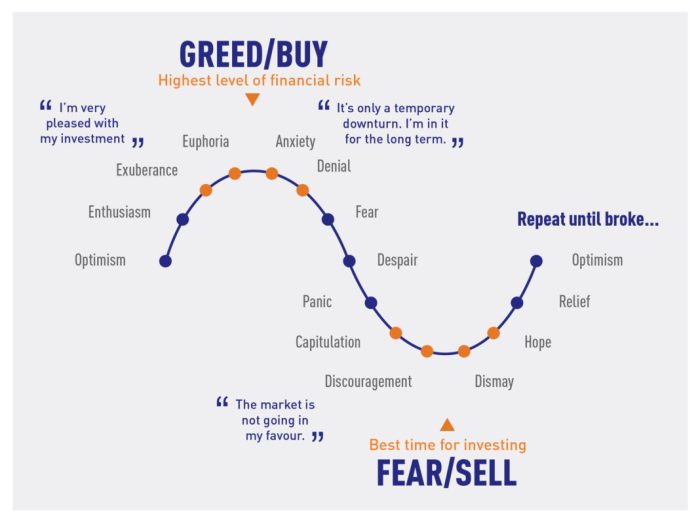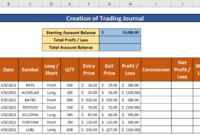Delving into Psychology of Forex trading, this introduction immerses readers in a unique and compelling narrative, with a focus on how emotions and cognitive biases play a crucial role in trading decisions within the forex market. By exploring the intricate connection between psychology and trading, we uncover the hidden factors that shape success and failure in this fast-paced environment.
As we navigate through the complexities of human behavior and decision-making, we unveil the key elements that drive traders towards profitability or loss, shedding light on the vital importance of understanding the psychological aspects of forex trading.
Understanding the Psychology of Forex Trading

The psychology of forex trading plays a crucial role in determining success or failure in the financial markets. Emotions can heavily impact trading decisions, leading traders to make irrational choices based on fear, greed, or overconfidence.
Impact of Emotions on Trading Decisions
Emotions such as fear and greed can cloud judgment and lead to impulsive actions in the forex market. Fear of losing money may cause traders to exit positions too early or hold onto losing trades for too long, hoping for a reversal. On the other hand, greed can drive traders to take excessive risks or over-leverage their positions in pursuit of higher profits.
Common Psychological Biases, Psychology of Forex trading
Traders often fall victim to common psychological biases such as confirmation bias, where they seek out information that confirms their existing beliefs while ignoring contradictory evidence. Additionally, recency bias can lead traders to focus too heavily on recent market movements, overlooking long-term trends.
Importance of Emotional Intelligence
Emotional intelligence is crucial for forex traders to maintain discipline, manage stress, and make rational decisions in the face of market volatility. It involves self-awareness, self-regulation, empathy, and social skills, all of which contribute to better trading performance and risk management.
Influence of Fear and Greed
Fear and greed are two powerful emotions that can significantly influence trading behavior. Fear of missing out (FOMO) may cause traders to enter trades at the wrong time, while greed can lead to overtrading and excessive risk-taking. It’s essential for traders to recognize and control these emotions to avoid costly mistakes in the forex market.
Risk Management and Psychological Factors
Risk management is a crucial aspect of successful forex trading, as it directly impacts trading psychology. Understanding your risk tolerance and risk aversion can help you make better decisions and manage emotions effectively during high-risk trading situations. Let’s delve deeper into how these factors influence trading psychology and explore strategies for effective risk management.
Impact of Risk Tolerance and Risk Aversion
- Risk tolerance refers to the level of risk that an individual is comfortable taking while trading forex. Traders with high risk tolerance may be more willing to take on larger positions and withstand market fluctuations.
- On the other hand, traders with low risk tolerance, or risk-averse traders, may prefer to trade with smaller positions and prioritize capital preservation over maximizing profits.
- Understanding your risk tolerance and risk aversion can help you determine the appropriate risk management strategies that align with your trading style and financial goals.
Strategies for Managing Emotions in High-Risk Situations
- Practice mindfulness techniques such as deep breathing or visualization to stay calm and focused during high-risk trading situations.
- Set clear stop-loss orders and adhere to them to avoid emotional decision-making based on fear or greed.
- Take breaks and step away from the screen if you feel overwhelmed or anxious, as emotions can cloud judgment and lead to impulsive actions.
Role of Discipline and Patience in Risk Management
- Discipline is essential in following your trading plan and sticking to your risk management rules, even when faced with challenging market conditions.
- Patience is key in waiting for high-probability trading opportunities and avoiding impulsive trades that deviate from your risk management strategy.
- Developing a disciplined and patient approach to risk management can help you maintain consistency in your trading performance and avoid unnecessary losses.
Cognitive Biases and Decision Making

When it comes to forex trading, cognitive biases can play a significant role in influencing trading outcomes. These biases are inherent in human psychology and can lead traders to make decisions based on emotions rather than logic.
Confirmation Bias
Confirmation bias is a common cognitive bias that can impact trading outcomes. This bias occurs when traders seek out information that confirms their pre-existing beliefs or opinions while ignoring contradictory data. In forex trading, confirmation bias can lead traders to only see information that supports their trade decisions, even if it may not be the most accurate or reliable data. To overcome confirmation bias, traders should actively seek out information that challenges their beliefs and consider all perspectives before making a trade.
Cognitive Dissonance
Cognitive dissonance refers to the discomfort experienced when a person holds contradictory beliefs or values. In forex trading, cognitive dissonance can occur when a trader ignores information that contradicts their trade decisions, leading to emotional distress and potentially poor trading outcomes. To address cognitive dissonance, traders should be open to reassessing their beliefs and decisions based on new information, even if it conflicts with their initial thoughts.
Building Mental Resilience in Forex Trading

Developing a resilient mindset is crucial for success in the forex market. Traders often face market volatility, emotional highs and lows, and unexpected challenges. Here are some techniques to help you build mental resilience in forex trading:
Impact of Past Trading Experiences on Future Decision-Making
Past trading experiences can significantly impact future decision-making in forex trading. If you have experienced success or failure in the past, it can influence your risk tolerance, confidence levels, and overall trading strategy. It is essential to reflect on past experiences, learn from mistakes, and use them to inform your future trading decisions.
Tips for Staying Focused and Disciplined During Trading Sessions
Staying focused and disciplined during trading sessions is key to maintaining mental resilience. Here are some tips to help you stay on track:
- Avoid emotional decision-making: Emotions can cloud judgment and lead to impulsive decisions. Stick to your trading plan and avoid making decisions based on fear or greed.
- Practice mindfulness: Stay present in the moment and avoid dwelling on past mistakes or worrying about future outcomes. Mindfulness can help you stay focused and make clear-headed decisions.
- Set realistic goals: Establish achievable goals for each trading session and track your progress. Celebrate small wins and learn from losses to improve your trading performance.
- Take breaks: Trading can be mentally demanding, so it’s essential to take breaks to recharge and refocus. Step away from the screen, go for a walk, or engage in a relaxing activity to clear your mind.
- Seek support: Join a trading community or work with a mentor to gain perspective, share experiences, and receive guidance. Surrounding yourself with like-minded individuals can help you stay motivated and accountable.
In conclusion, the Psychology of Forex trading offers a profound insight into the inner workings of traders’ minds, emphasizing the significance of emotional intelligence, risk management, and mental resilience in achieving success in the forex market. By mastering the psychological aspects of trading, individuals can enhance their decision-making processes and navigate the volatile landscape of forex with confidence and clarity.
Spot Forex trading is a popular way for traders to participate in the foreign exchange market. It involves buying and selling currency pairs at the current market price. To learn more about Spot Forex trading, check out this detailed guide on Spot Forex trading explained.
Managing risk is crucial in Forex trading to protect your capital from significant losses. Traders use various risk management techniques to minimize potential risks. If you want to learn more about how to effectively manage risk in Forex, you can refer to this informative article on How to manage risk in Forex.
One popular trading strategy in Forex is using Fibonacci retracement levels to identify potential entry and exit points. By understanding how to trade using Fibonacci retracement, traders can improve their trading accuracy. To explore this strategy further, you can read this comprehensive guide on How to trade using Fibonacci retracement.




